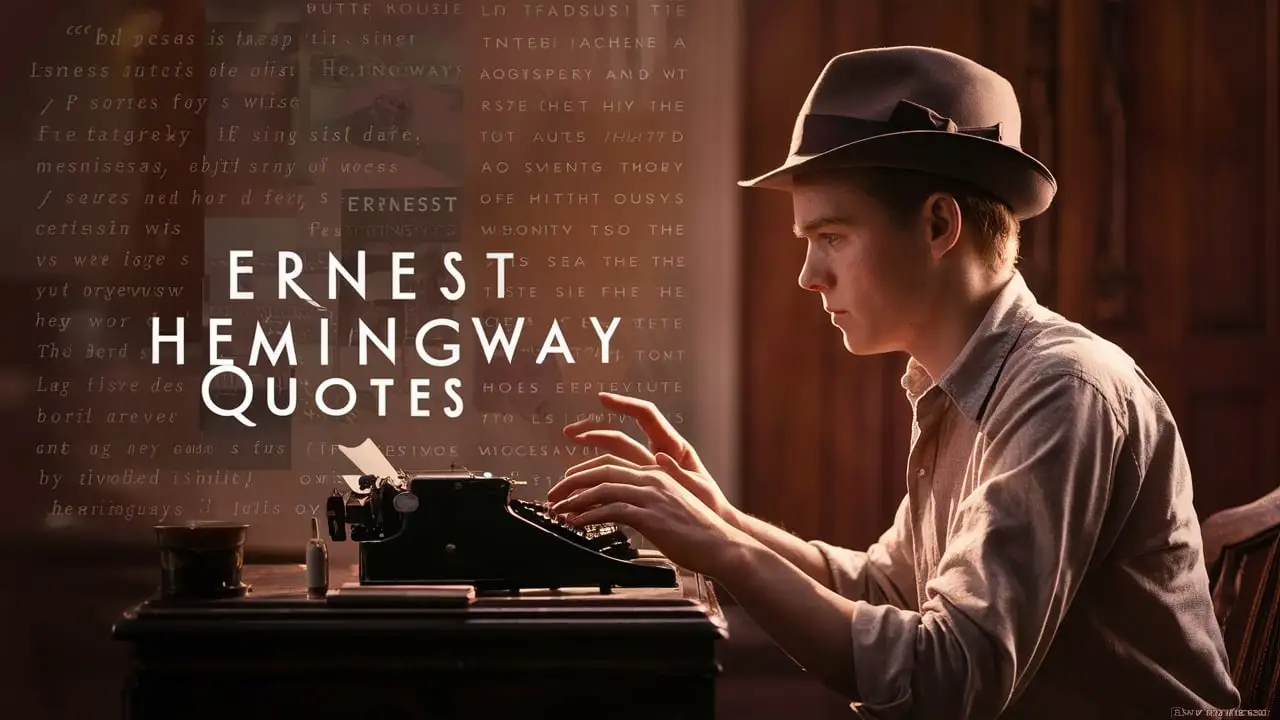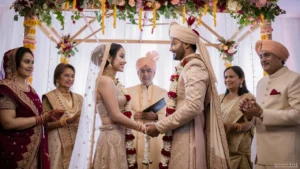In this post, we explore some of Ernest Hemingway Quotes, each offering a glimpse into his remarkable mind.
Ernest Hemingway, a literary giant known for his succinct and impactful writing style, left behind a legacy of quotes that continue to inspire and provoke thought. His words reflect his deep understanding of life, war, love, and human nature.
Ernest Hemingway on Life
“The world breaks everyone, and afterward, many are strong in the broken places.”
Author: Ernest Hemingway
Description:
Hemingway reflects on the resilience that can come from enduring life’s hardships.
“Courage is grace under pressure.”
Author: Ernest Hemingway
Description:
This quote embodies Hemingway’s belief that true courage is shown in the face of adversity.
“To write about life first, you must live it.”
Author: Ernest Hemingway
Description:
Hemingway emphasizes the importance of experiencing life fully to write authentically.
“Every man’s life ends the same way. It is only the details of how he lived and how he died that distinguish one man from another.”
Author: Ernest Hemingway
Description:
Hemingway highlights the importance of how we live, not just how we die.
“Happiness in intelligent people is the rarest thing I know.”
Author: Ernest Hemingway
Description:
Hemingway notes the complex relationship between intelligence and happiness.
“There is nothing noble in being superior to your fellow man; true nobility is being superior to your former self.”
Author: Ernest Hemingway
Description:
Hemingway advocates for personal growth rather than comparing oneself to others.
“We are all apprentices in a craft where no one ever becomes a master.”
Author: Ernest Hemingway
Description:
Hemingway speaks to the lifelong journey of learning and self-improvement.
“The rain will stop, the night will end, the hurt will fade. Hope is never so lost that it can’t be found.”
Author: Ernest Hemingway
Description:
Hemingway offers a message of resilience and the enduring presence of hope.
“The best people possess a feeling for beauty, the courage to take risks, the discipline to tell the truth, the capacity for sacrifice.”
Author: Ernest Hemingway
Description:
Hemingway describes the virtues of the best people he knows.
“All you have to do is write one true sentence. Write the truest sentence that you know.”
Author: Ernest Hemingway
Description:
Hemingway believed in the power of truth in writing and life.
Ernest Hemingway on Love
“You are so brave and quiet I forget you are suffering.”
Author: Ernest Hemingway
Description:
Hemingway touches on the hidden pain that often accompanies bravery in love.
“The way to make people trustworthy is to trust them.”
Author: Ernest Hemingway
Description:
Trust is a recurring theme in Hemingway’s view on relationships, built through giving it first.
“When people talk, listen completely. Most people never listen.”
Author: Ernest Hemingway
Description:
Hemingway valued deep, attentive listening as a key to meaningful relationships.
“The most painful thing is losing yourself in the process of loving someone too much, and forgetting that you are special too.”
Author: Ernest Hemingway
Description:
Hemingway warns against losing one’s identity in the process of loving another.
“The world is a fine place and worth fighting for, and I hate very much to leave it.”
Author: Ernest Hemingway
Description:
Despite life’s struggles, Hemingway found the world and the love in it worth holding onto.
“There’s no one true thing. It’s all true.”
Author: Ernest Hemingway
Description:
Hemingway understood that truth in love and life is complex and multifaceted.
“Never confuse movement with action.”
Author: Ernest Hemingway
Description:
In relationships, Hemingway saw the importance of meaningful action over mere activity.
“You can’t get away from yourself by moving from one place to another.”
Author: Ernest Hemingway
Description:
Hemingway believed that personal issues must be confronted internally, not externally.
“All things truly wicked start from innocence.”
Author: Ernest Hemingway
Description:
Hemingway often explored the theme of how innocence can lead to unintended consequences in love.
“The shortest answer is doing the thing.”
Author: Ernest Hemingway
Description:
Hemingway emphasized the importance of action, especially in matters of the heart.
Ernest Hemingway on Writing
“There is nothing to writing. All you do is sit down at a typewriter and bleed.”
Author: Ernest Hemingway
Description:
Hemingway saw writing as an intense, emotional process that requires deep vulnerability.
“Write drunk, edit sober.”
Author: Ernest Hemingway
Description:
This famous quote emphasizes the importance of uninhibited creativity followed by careful refinement.
“All good books are alike in that they are truer than if they had happened.”
Author: Ernest Hemingway
Description:
Hemingway believed that good writing should evoke truth, even if the story itself is fictional.
“I aim to put down on paper what I see and what I feel in the best and simplest way.”
Author: Ernest Hemingway
Description:
Hemingway’s writing style was characterized by simplicity and clarity, reflecting his desire to convey deep truths.
“Prose is architecture, not interior decoration, and the Baroque is over.”
Author: Ernest Hemingway
Description:
Hemingway saw writing as a structured craft that should be clean and functional, rather than ornate.
“There is no rule on how to write. Sometimes it comes easily and perfectly; sometimes it’s like drilling rock and then blasting it out with charges.”
Author: Ernest Hemingway
Description:
Hemingway acknowledged the unpredictability of the creative process, sometimes effortless, other times arduous.
“The first draft of anything is shit.”
Author: Ernest Hemingway
Description:
Hemingway believed that great writing is the result of relentless revision and refinement, starting with imperfect drafts.
“You shouldn’t write if you can’t write.”
Author: Ernest Hemingway
Description:
Hemingway had a pragmatic view of writing, believing that one should only pursue it if they have the talent and discipline to do so.
“The writer’s job is to tell the truth.”
Author: Ernest Hemingway
Description:
Hemingway saw the writer’s role as a truth-teller, committed to conveying reality through their work.
“When writing a novel a writer should create living people; people, not characters. A character is a caricature.”
Author: Ernest Hemingway
Description:
Hemingway believed in creating authentic, lifelike characters that resonate with readers as real individuals.
Ernest Hemingway on War and Conflict
“Never think that war, no matter how necessary, nor how justified, is not a crime.”
Author: Ernest Hemingway
Description:
Hemingway, a veteran of World War I, saw the horrors of war firsthand and believed in its inherent tragedy.
“War is not won by victory.”
Author: Ernest Hemingway
Description:
Hemingway believed that war, even when won, leaves deep scars and unresolved issues.
“The only thing that could spoil a day was people. People were always the limiters of happiness except for the very few that were as good as spring itself.”
Author: Ernest Hemingway
Description:
Hemingway appreciated the solitude and the simplicity of nature, but finding people often complicated his peace.
“You can wipe out your opponents. But if you do it unjustly, you become eligible for being wiped out yourself.”
Author: Ernest Hemingway
Description:
Hemingway saw justice as a crucial element in conflict, without which victory could lead to downfall.
“The world breaks everyone, and afterward, many are strong in the broken places.”
Author: Ernest Hemingway
Description:
Hemingway believed that life’s challenges could either destroy or strengthen us, depending on how we respond.
“All things truly wicked start from an innocence.”
Author: Ernest Hemingway
Description:
This quote reflects Hemingway’s belief that evil often has roots in something pure, a common motif in his stories.
“The first draft of anything is shit.”
Author: Ernest Hemingway
Description:
Hemingway was a perfectionist, understanding that great writing requires relentless revision and refinement.
“In modern war… you will die like a dog for no good reason.”
Author: Ernest Hemingway
Description:
Hemingway had a bleak view of modern warfare, seeing it as senseless and brutal.
“You know that fiction, prose rather, is possibly the roughest trade of all in writing.”
Author: Ernest Hemingway
Description:
Hemingway acknowledged the challenges of writing fiction, drawing parallels to the struggles of war.
“In war, there is no prize for the runner-up.”
Author: Ernest Hemingway
Description:
Hemingway’s experiences in war shaped his belief in the unforgiving nature of conflict.
Ernest Hemingway on Death
“Every man’s life ends the same way. It is only the details of how he lived and how he died that distinguish one man from another.”
Author: Ernest Hemingway
Description:
Hemingway emphasized the importance of how we live, not just how we die.
“There is no lonelier man in death than that man who has lived many years with a good wife and then outlived her.”
Author: Ernest Hemingway
Description:
Hemingway understood the profound loneliness that can come from losing a loved one.
“But man is not made for defeat. A man can be destroyed but not defeated.”
Author: Ernest Hemingway
Description:
This quote reflects Hemingway’s belief in human resilience, even in the face of death.
“To die is easy. To live is the hard thing.”
Author: Ernest Hemingway
Description:
Hemingway believed that the true challenge lies in living a full and meaningful life, not in facing death.
“The world breaks everyone, and afterward, many are strong in the broken places.”
Author: Ernest Hemingway
Description:
Hemingway believed that life’s hardships could either destroy us or make us stronger, even in the face of death.
“You belong to me and all Paris belongs to me and I belong to this notebook and this pencil.”
Author: Ernest Hemingway
Description:
Hemingway expressed his sense of ownership and belonging, even in the face of death.
“All stories, if continued far enough, end in death, and he is no true storyteller who would keep that from you.”
Author: Ernest Hemingway
Description:
Hemingway saw death as the inevitable conclusion to all stories, a truth that must be acknowledged.
“A man does not die of love or his liver or even of old age; he dies of being a man.”
Author: Ernest Hemingway
Description:
Hemingway believed that the essence of being human is what ultimately leads to death.
“Cowards die a thousand deaths, but the brave die but once.”
Author: Ernest Hemingway
Description:
Hemingway admired bravery in the face of death, believing that true courage lies in accepting mortality.
“The world is a fine place and worth fighting for, and I hate very much to leave it.”
Author: Ernest Hemingway
Description:
Hemingway’s love for life is evident here, despite his recognition of its inherent struggles.
Ernest Hemingway on Strength and Resilience
“But man is not made for defeat. A man can be destroyed but not defeated.”
Author: Ernest Hemingway
Description:
This quote embodies Hemingway’s belief in the unyielding human spirit.
“The world breaks everyone, and afterward, many are strong in the broken places.”
Author: Ernest Hemingway
Description:
Hemingway believed that life’s challenges could either destroy or strengthen us, depending on how we respond.
“Courage is grace under pressure.”
Author: Ernest Hemingway
Description:
Hemingway defined courage as the ability to maintain dignity and poise in difficult situations.
“You belong to me and all Paris belongs to me and I belong to this notebook and this pencil.”
Author: Ernest Hemingway
Description:
Hemingway expressed a deep sense of belonging and ownership, even in the face of challenges.
“The rain will stop, the night will end, the hurt will fade. Hope is never so lost that it can’t be found.”
Author: Ernest Hemingway
Description:
Hemingway offered a message of resilience and the enduring presence of hope.
“The world is a fine place and worth fighting for, and I hate very much to leave it.”
Author: Ernest Hemingway
Description:
Hemingway’s love for life is evident here, despite his recognition of its inherent struggles.
“All you have to do is write one true sentence. Write the truest sentence that you know.”
Author: Ernest Hemingway
Description:
Hemingway believed in the power of truth in writing and life, even in difficult times.
“You are so brave and quiet I forget you are suffering.”
Author: Ernest Hemingway
Description:
Hemingway touched on the hidden pain that often accompanies bravery in difficult situations.
“The best people possess a feeling for beauty, the courage to take risks, the discipline to tell the truth, the capacity for sacrifice.”
Author: Ernest Hemingway
Description:
Hemingway admired those who, despite their vulnerabilities, showed remarkable strength and resilience.
“But life isn’t hard to manage when you’ve nothing to lose.”
Author: Ernest Hemingway
Description:
Hemingway saw resilience as a natural response when one has little left to lose.
Ernest Hemingway on Truth
“The writer’s job is to tell the truth.”
Author: Ernest Hemingway
Description:
Hemingway saw the writer’s role as a truth-teller, committed to conveying reality through their work.
“All you have to do is write one true sentence. Write the truest sentence that you know.”
Author: Ernest Hemingway
Description:
Hemingway believed in the power of truth in writing and life.
“There’s no one true thing. It’s all true.”
Author: Ernest Hemingway
Description:
Hemingway understood that truth in life and relationships is complex and multifaceted.
“When writing a novel a writer should create living people; people, not characters. A character is a caricature.”
Author: Ernest Hemingway
Description:
Hemingway believed in creating authentic, lifelike characters that resonate with readers as real individuals.
“All good books are alike in that they are truer than if they had happened.”
Author: Ernest Hemingway
Description:
Hemingway believed that good writing should evoke truth, even if the story itself is fictional.
“The first draft of anything is shit.”
Author: Ernest Hemingway
Description:
Hemingway believed that great writing is the result of relentless revision and refinement, starting with imperfect drafts.
“Write drunk, edit sober.”
Author: Ernest Hemingway
Description:
This famous quote emphasizes the importance of uninhibited creativity followed by careful refinement.
“You shouldn’t write if you can’t write.”
Author: Ernest Hemingway
Description:
Hemingway had a pragmatic view of writing, believing that one should only pursue it if they have the talent and discipline to do so.
“The shortest answer is doing the thing.”
Author: Ernest Hemingway
Description:
Hemingway valued action over words, especially in matters of truth.
“There is nothing to writing. All you do is sit down at a typewriter and bleed.”
Author: Ernest Hemingway
Description:
Hemingway saw writing as an intense, emotional process that requires deep vulnerability and honesty.
Ernest Hemingway on Courage
“Courage is grace under pressure.”
Author: Ernest Hemingway
Description:
Hemingway defined courage as the ability to maintain dignity and poise in difficult situations.
“But man is not made for defeat. A man can be destroyed but not defeated.”
Author: Ernest Hemingway
Description:
This quote embodies Hemingway’s belief in the unyielding human spirit, especially in the face of adversity.
“The world breaks everyone, and afterward, many are strong in the broken places.”
Author: Ernest Hemingway
Description:
Hemingway believed that life’s challenges could either destroy or strengthen us, depending on how we respond.
“You are so brave and quiet I forget you are suffering.”
Author: Ernest Hemingway
Description:
Hemingway touched on the hidden pain that often accompanies bravery in difficult situations.
“All you have to do is write one true sentence. Write the truest sentence that you know.”
Author: Ernest Hemingway
Description:
Hemingway believed in the power of truth in writing and life, even in difficult times.
“The rain will stop, the night will end, the hurt will fade. Hope is never so lost that it can’t be found.”
Author: Ernest Hemingway
Description:
Hemingway offered a message of resilience and the enduring presence of hope in the face of adversity.
“The best people possess a feeling for beauty, the courage to take risks, the discipline to tell the truth, the capacity for sacrifice.”
Author: Ernest Hemingway
Description:
Hemingway admired those who, despite their vulnerabilities, showed remarkable courage.
“But life isn’t hard to manage when you’ve nothing to lose.”
Author: Ernest Hemingway
Description:
Hemingway saw courage as a natural response when one has little left to lose.
“The way to make people trustworthy is to trust them.”
Author: Ernest Hemingway
Description:
Hemingway believed that trust is built through courage and taking risks in relationships.
“The world is a fine place and worth fighting for, and I hate very much to leave it.”
Author: Ernest Hemingway
Description:
Hemingway’s love for life is evident here, despite his recognition of its inherent struggles and the courage it takes to live fully.
Ernest Hemingway on Simplicity
“I aim to put down on paper what I see and what I feel in the best and simplest way.”
Author: Ernest Hemingway
Description:
Hemingway’s writing style was characterized by simplicity and clarity, reflecting his desire to convey deep truths.
“Prose is architecture, not interior decoration, and the Baroque is over.”
Author: Ernest Hemingway
Description:
Hemingway saw writing as a structured craft that should be clean and functional, rather than ornate.
“There is no rule on how to write. Sometimes it comes easily and perfectly; sometimes it’s like drilling rock and then blasting it out with charges.”
Author: Ernest Hemingway
Description:
Hemingway acknowledged the unpredictability of the creative process, sometimes effortless, other times arduous.
“The shortest answer is doing the thing.”
Author: Ernest Hemingway
Description:
Hemingway valued action over words, especially in matters of simplicity.
“Never confuse movement with action.”
Author: Ernest Hemingway
Description:
Hemingway emphasized the importance of meaningful action over mere activity.
“You can’t get away from yourself by moving from one place to another.”
Author: Ernest Hemingway
Description:
Hemingway believed that personal issues must be confronted internally, not externally.
“Write drunk, edit sober.”
Author: Ernest Hemingway
Description:
This famous quote emphasizes the importance of uninhibited creativity followed by careful refinement, capturing Hemingway’s approach to simplicity in writing.
“The first draft of anything is shit.”
Author: Ernest Hemingway
Description:
Hemingway believed that great writing is the result of relentless revision and refinement, starting with imperfect drafts.
“There is nothing to writing. All you do is sit down at a typewriter and bleed.”
Author: Ernest Hemingway
Description:
Hemingway saw writing as an intense, emotional process that requires deep vulnerability and honesty, stripped of unnecessary complexity.
“To write about life first, you must live it.”
Author: Ernest Hemingway
Description:
Hemingway emphasized the importance of experiencing life fully to write authentically, keeping the process simple and true.
Ernest Hemingway on Love and Loss
“You are so brave and quiet I forget you are suffering.”
Author: Ernest Hemingway
Description:
Hemingway touches on the hidden pain that often accompanies bravery in love and loss.
“The most painful thing is losing yourself in the process of loving someone too much, and forgetting that you are special too.”
Author: Ernest Hemingway
Description:
Hemingway warns against losing one’s identity in the process of loving another.
“All things truly wicked start from innocence.”
Author: Ernest Hemingway
Description:
Hemingway often explored the theme of how innocence can lead to unintended consequences in love.
“The way to make people trustworthy is to trust them.”
Author: Ernest Hemingway
Description:
Trust is a recurring theme in Hemingway’s view on relationships, built through giving it first.
“When people talk, listen completely. Most people never listen.”
Author: Ernest Hemingway
Description:
Hemingway valued deep, attentive listening as a key to meaningful relationships.
“The world is a fine place and worth fighting for, and I hate very much to leave it.”
Author: Ernest Hemingway
Description:
Despite life’s struggles, Hemingway found the world and the love in it worth holding onto.
“The shortest answer is doing the thing.”
Author: Ernest Hemingway
Description:
Hemingway emphasized the importance of action, especially in matters of the heart.
“You can’t get away from yourself by moving from one place to another.”
Author: Ernest Hemingway
Description:
Hemingway believed that personal issues must be confronted internally, not externally, especially in love.
“A man does not die of love or his liver or even of old age; he dies of being a man.”
Author: Ernest Hemingway
Description:
Hemingway believed that the essence of being human and loving deeply is what ultimately leads to death.
“Cowards die a thousand deaths, but the brave die but once.”
Author: Ernest Hemingway
Description:
Hemingway admired bravery in love and loss, believing that true courage lies in accepting and confronting the pain of both.










